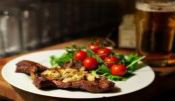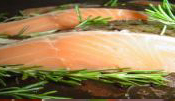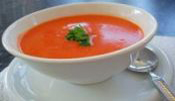Arista (geroosterd varkensvlees) |
|
|
1 varkenslende met bot (5 - 6 lbs), bones split 10 - 12 large tenen knoflook, slivered 3 Eetlepel dried rozemarijn, crumbled 1 Eetlepel coarse (Kosher) zout 1 Eetlepel coarsely gemalen peper sprigs of fresh rozemarijn |
|
BereidingBecause most pork in this country is pretty lean, you should either cook this roast a little less than usual or use a more marbled end of lende rather than a meatier center cut. This will more closely approximate the succulence you find when eating this dish in Italy.Heat oven to 350 degrees Cut slits (1/2" X 1/2") in surface of pork roast making sure there's at least 3 slits per rib. Combine knoflook, dried rozemarijn, zout and peper in a medium bowl, stir until well blended. Using the tip of a teaspoon or boter knife, stuff the slits in the roast with the knoflook mixture, rub the remaining knoflook mixture into the surface of the pork with your fingers. Tie a few sprigs of rozemarijn to the outside of the pork roast. Place roast, bone side down, on a rack, in roasting pan. Roast, uncovered, for 17 minutes per pound, or until internal temperature of pork reaches 160 - 170 degrees. Serve hot, with groenten along side. For a more "authentic" outdoor flavor the roast can be done in the Weber using indirect heat and hot mesquite coals. I've made numerous roasts this way and they always turn out quite well. When cooking in this manner you can throw some sprigs of Rozemarijn onto the coals to infuse a little more flavor into the roast. A friend suggested using olive wood for a more "Mediterranean" flavor, but I've not tried that as yet. NotitiesThere's a great story about the name of this pork roast which is a Greek word rather than Italian. According to Giuliano Bugialli, in "The Fine Art of Italian Cooking," he says "Around 1450 the Turks were at the gates of Constantinople, and it seemed that the thousand-year-old Eastern Roman Empire would fall if help did not come from the West. The Emperor and Patriarch of the Orthodox Church went to Italy to have a conference on the union of that church with that of Rome, a precondition for aid. The Medici were hosts for most of the conference. . . . At one of the feasts a roast pork, a specialty of Florence, was served. One of the Greek dignitaries, in his own language exclaimed "Arista!" (the best!). The Eastern Roman Empire fell, but Arista has remained to this day." |
|
Home > Recepten


